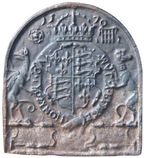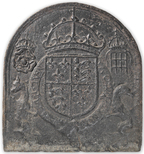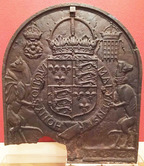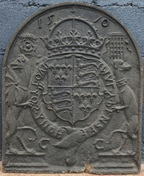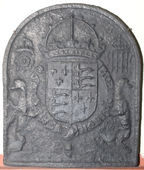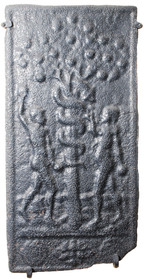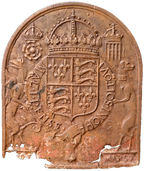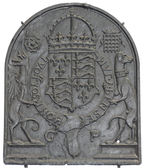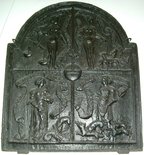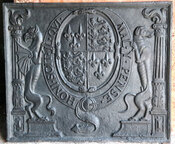-
1135
Description: Arched shape; fillet edging; top centre, date; decorative Tudor royal shield, crown, garter (motto clockwise but reversed) and supporters (dragon and greyhound); a rose to the left and a portcullis (grid of 6) to the right side of crown; the supporters stand on a horizontal compartment which, on similar firebacks, often contains the date.
Notes: There are several firebacks with the Tudor royal arms that were probably originally produced in the Spanish Netherlands, perhaps illustrating the association between England and Spain through the marriage of Henry VIII and Katherine of Aragon. The firebacks differ in several small details, such as the form and rotation of the Garter motto, the style of the crown, the positioning of the supporters in relation to the Garter, and the form and size of the rose and portcullis.
Inscription: 15 70 / HONY SOYT QVI MAL Y PENSE
Arms: English royal Tudor
- Decoration tags:
- rounded arched (shape)
- fillet (edging)
- whole carved pattern
- individual numbers
- heraldic
- armorial
- text
Manufactured: in 1570 possibly in the Wallonia area of Luxemburg.
Current location: not known.
- Attached to series:
- Tudor royal armorial firebacks
- Continental Tudor royal armorial firebacks
-
1163
Description: Arched; ogee edging; Tudor royal shield, garter, crown and supporters (dragon and greyhound); top left, crowned Tudor rose; top right, crowned portcullis (grid of 6).
Notes: There are several firebacks with the Tudor royal arms that were probably produced in the Spanish Netherlands, perhaps illustrating the association between England and Spain through the marriage of Henry VIII and Katherine of Aragon. The firebacks differ in several small details, such as the form and rotation of the Garter motto, the style of the crown, the positioning of the supporters in relation to the Garter, and the form and size of the crowned rose and portcullis.; the placement of the rose and crown and of the crown above the portcullis suggest that they are stamps impressed over the original moulded design before casting. Bonhams auction, Oxford, 19 Feb 2020, lot 292.
Inscription: HONI SOIT QVI MAL I PENSE
Arms: Tudor royal
- Decoration tags:
- rounded arched (shape)
- cyma reversa/ogee (edging)
- carved stamps
- whole carved pattern
- heraldic
- armorial
- text
- animals
Manufactured: in the mid-16th century possibly in the Wallonia area of Luxemburg.
Current location: not known.
- Attached to series:
- Tudor royal armorial firebacks
- Continental Tudor royal armorial firebacks
-
1175
Description: Arch-shaped; fillet edge; Tudor shield, crown (with a circlet of acanthus leaves), garter (motto clockwise) and supporters. Crowned rose on dexter, and crowned portcullis (grid of 16) on sinister side of crown; the supporters, a dragon and a greyhound, stand on separate plinths; on the plinth below the greyhound is the number 28, probably half of the date 1528, the other part missing on the left side.
Notes: There are several firebacks with the Tudor royal arms that were probably produced in the Spanish Netherlands, perhaps illustrating the association between England and Spain through the marriage of Henry VIII and Katherine of Aragon. The firebacks differ in several small details, such as the form and rotation of the Garter motto, the style of the crown, the positioning of the supporters in relation to the Garter, and the form and size of the crowned rose and portcullis.
Inscription: HONY SOIT QVI MAL Y PENSE / 28
Arms: Tudor royal
- Decoration tags:
- rounded arched (shape)
- fillet (edging)
- whole carved pattern
- heraldic
- armorial
- royal
- text
Manufactured: in 1528 possibly in the Wallonia area of Luxemburg.
Current location: Consuegra, Toledo, Spain.
- Attached to series:
- Tudor royal armorial firebacks
- Continental Tudor royal armorial firebacks
-
1261
Description: Arch-shaped; fillet edge; at top, date split by crown (horizontal of '7' missing), crown over a Tudor shield, garter (motto clockwise but reversed) and supporters; rose with viscount's coronet on dexter, and portcullis (grid of 16) with viscount's coronet on sinister side of crown; the supporters, a dragon and a greyhound, stand on separate plinths; the initials, G C, are placed in either side of the garter buckle.
Notes: There are several firebacks with the Tudor royal arms that were probably originally produced in the Spanish Netherlands, perhaps illustrating the association between England and Spain through the marriage of Henry VIII and Katherine of Aragon. The firebacks differ in several small details, such as the shape of the shield, the form and rotation of the Garter motto, the style of the crown, the positioning of the supporters in relation to the Garter, and the form and size of the crowned rose and portcullis. Hôtel Drouot auction, Paris, 21 Jan 2023, lot 89.
Inscription: 15 70 / HONY SOYT QVI MAL Y PENSE / G C
Arms: Tudor royal
- Decoration tags:
- rounded arched (shape)
- fillet (edging)
- carved stamps
- whole carved pattern
- heraldic
- armorial
- royal
- text
- animals
Manufactured: in 1570 possibly in the Wallonia area of Luxemburg.
Current location: not known.
- Attached to series:
- Tudor royal armorial firebacks
- Continental Tudor royal armorial firebacks
-
397
Description: Arched; fillet edging; Tudor royal shield, garter, crown and supporters (dragon and greyhound); top left, crowned Tudor rose; top right, crowned portcullis (grid of 6).
Notes: There are several firebacks with the Tudor royal arms that were probably produced in the Spanish Netherlands, perhaps illustrating the association between England and Spain through the marriage of Henry VIII and Katherine of Aragon. The firebacks differ in several small details, such as the form and rotation of the Garter motto, the style of the crown, the positioning of the supporters in relation to the Garter, and the form and size of the crowned rose and portcullis.
Copies of this fireback are known.
Inscription: HONI SOIT QVI MAL I PENSE
Arms: Tudor royal
- Decoration tags:
- rounded arched (shape)
- fillet (edging)
- whole carved pattern
- heraldic
- armorial
- royal
- text
Manufactured: in the mid-16th century possibly in the Wallonia area of Luxemburg.
Current location: Anne of Cleves House, Southover High Street, Lewes, East Sussex, England.
Museum number: LH000.915 (part of the Sussex Archaeological Society museum group)
Citation: Lloyd, N., 1925, 'Domestic Ironwork I', Architectural Review, 58, pp. 58-67.
- Attached to series:
- Tudor royal armorial firebacks
- Continental Tudor royal armorial firebacks
-
562
Description: Rectangular; flanged edging; main panel, pictorial scene of Adam and Eve with, between them, the Tree of Life, bearing fruit, entwined by a serpent; bottom panel indistinct.
Notes: A much worn plate. Mitford collection, Petworth House.
Copies of this fireback are known.
- Decoration tags:
- rectangular (shape)
- flanged (edging)
- whole carved pattern
- pictorial
- biblical
- humans
Manufactured: in the mid- to late-16th century possibly in the Wallonia area of Belgium.
Current location: Petworth House, Petworth, West Sussex, England.
Museum number: NT/PET/M/56 (part of the National Trust museum group)
- Attached to series:
- Stoveplates
-
983
Description: Arched shape; cavetto-moulded edge; Tudor royal shield, crown, garter (with inscription anti-clockwise) and supporters (dragon and greyhound); crowned rose on left, and crowned portcullis on right side of crown; the supporters stand on a horizontal fillet, to the bottom right of which is the end of an illegible inscription.
Notes: There are several firebacks with the Tudor royal arms that were probably produced in the Spanish Netherlands, perhaps illustrating the association between England and Spain through the marriage of Henry VIII and Katherine of Aragon. The firebacks differ in several small details, such as the form and rotation of the Garter motto, the style of the crown, the positioning of the supporters in relation to the Garter, and the form and size of the crowned rose and portcullis.
Inscription: HONI SOIT QVI MAL I PENSE / [illeg.]
Arms: Tudor royal
- Decoration tags:
- rounded arched (shape)
- cavetto (edging)
- whole carved pattern
- planklines
- armorial
- royal
- text
Manufactured: in the mid-16th century in the Wallonia area of Luxemburg.
Current location: not known.
- Attached to series:
- Tudor royal armorial firebacks
- Continental Tudor royal armorial firebacks
-
747
Description: Arch-shaped; fillet edge; Tudor shield, crown, garter (motto clockwise but reversed) and supporters. Crowned rose on dexter, and crowned portcullis (grid of 16) on sinister side of crown; the supporters, a dragon and a greyhound, stand on separate plinths; the initials, G P are placed in either side of the garter buckle.
Notes: There are several firebacks with the Tudor royal arms that were probably originally produced in the Spanish Netherlands, perhaps illustrating the association between England and Spain through the marriage of Henry VIII and Katherine of Aragon. The firebacks differ in several small details, such as the form and rotation of the Garter motto, the style of the crown, the positioning of the supporters in relation to the Garter, and the form and size of the crowned rose and portcullis. Part of the bequest to the Victoria and Albert Museum by Lieut. Colonel G. B. Croft-Lyons in 1926.
Inscription: HONY SOYT QVI MAL Y PENSE / G P
Arms: Tudor royal
- Decoration tags:
- rounded arched (shape)
- fillet (edging)
- whole carved pattern
- heraldic
- armorial
- royal
- text
Manufactured: in the mid-16th century possibly in the Wallonia area of Luxemburg.
Current location: Victoria & Albert Museum, Cromwell Road, Kensington & Chelsea, Greater London, England.
Museum number: M.499-1926 (part of the Victoria & Albert Museum museum group)
- Attached to series:
- Tudor royal armorial firebacks
- Continental Tudor royal armorial firebacks
-
753
Description: Arched rectangular shape; parallel astragal and fillet edging; four panels divied by fillets, an orb with a cross at the intersection; top left, naked female figure holding scales in her right hand, a scroll bearing an inscription above her and to her left and right; top right, a naked female figure holding a hawk in her right hand and leading two dogs with her left hand, a scroll bearing an inscription above her and to her left and right; bottom left, a clothed female figure, at her feet a fox attacking a serpent, a scroll bearing an inscription above her and to her left and right; bottom right, a clothed female figure, at her feet hounds chasing and attacking another animal, a scroll bearing an inscription above her and to her left and right.
Notes: The figures (clockwise from top left) probably represent Justice and Vigilance (both naked), Indifference and Perfidy (both clothed).
Copies of this fireback are known.
Inscription: ..T IS V EN SCHADE DAT TROV IS LICHTER DAN PLVME / ICH JAG OM DIE VINDE OFT ICH TROV KOND FINDEN / TROV IS DOET ONTROVE VERDT VERFAVLEN / ONTOVE LOEPT OVER ..AL
- Decoration tags:
- rectangular with round arch (shape)
- astragal & fillet (edging)
- whole carved pattern
- planklines
- pictorial
- allegorical
- text
- humans
Manufactured: in the late-16th century possibly in the Wallonia area of Belgium.
Current location: Victoria & Albert Museum, Cromwell Road, Kensington & Chelsea, Greater London, England.
Museum number: 142.1898 (part of the Victoria & Albert Museum museum group)
- Attached to series:
- Virtues and Faults firebacks
-
1010
Description: Rectangular with ovolo-moulded edging; central oval shield of England (quarterly France modern and England) surrounded by the Garter with the additional word 'IL', and supported by a dragon on the dexter side and a greyhound on the sinister side, each standing on a plinth; to each side of the armorial group is a column with the upper part of the shaft fluted and the lower part foliate; each has an Ionic capital and a moulded pedestal; fire issues from the top of the capital.
Notes: The style of carving is not typical of English design but is similar to other firebacks bearing Tudor armorials that were probably cast in Wallonia.
Inscription: HONI SOIT IL QVI MAL Y PENSE
Arms: English royal Tudor (prob. Henry VIII)
- Decoration tags:
- rectangular (shape)
- ovolo (edging)
- whole carved pattern
- armorial
- royal
Manufactured: in the 17th century possibly in the Wallonia area of Belgium.
Current location: Westpreussenring 1, Saarbrucken, Saarland, Germany.
Citation: Carpentier, H., 1912, Plaques de Cheminées (Paris, published by the author).
- Attached to series:
- Tudor royal armorial firebacks
- Continental Tudor royal armorial firebacks
